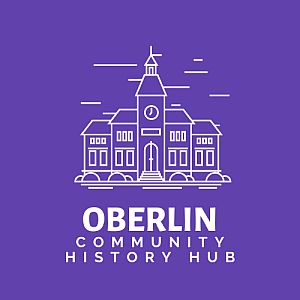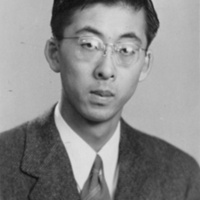Kenji Okuda
Title
Kenji Okuda
Description
Kenji Okuda was one of the nearly forty Japanese American students who studied at Oberlin College and Conservatory during World War II, many of them, like Okuda, coming to Oberlin directly from internment camps. Okuda gained national attention when he was elected president of the Oberlin student body in 1943.
Birth Date
August 7, 1922
Birthplace
Seattle, Washington
Death Date
November 15, 2011
Occupation
Economics Professor
Biographical Text
Kenji Okuda was born in Seattle in 1922 to a well-known family in the Japanese community. After graduating from high school, he spent a gap year in Japan before returning to begin his studies at University of Washington in 1940.
In February 1942, the U.S. government announced plans to forcibly evacuate all Japanese and Japanese Americans from the west coast and to relocate them to internment camps in the interior of the country. Okuda served as a student representative on University of Washington’s committee dealing with student evacuation and relocation issues. He also helped authorities prepare the Puyallup Fair Grounds, the temporary evacuation site for Seattle's Japanese community, before their evacuation.
Okuda soon became angry at both the hypocrisy of a democracy interning its own citizens and at the condition in the camps. A pacifist who belonged to the Fellowship of Reconciliation, Okuda registered as a conscientious objector while confined at Puyallup. These actions made him suspect in the eyes of the US military authorities, and when the residents of Puyallup were relocated to a permanent camp, Okuda was deliberately sent to a different camp from the rest of the community.
Okuda had been admitted to Oberlin soon after the evacuation order on the recommendation of another Japanese-American Oberlin student from Seattle, Harry Yamaguchi. But the army initially refused to give him security clearance to leave the Granada internment camp, both because of his political activities and because he had spent time in Japan. He would spend months imprisoned at Granada before reaching Oberlin.
Okuda arrived at Oberlin in the spring semester of 1943 and was soon elected student body president, an event that gained national attention given the prevailing anti-Japanese sentiment in the U.S. at the time. At Oberlin he embraced what he saw as his duty to be an emissary communicating the "problems of the Japanese and Japanese Americans" to the broader community. During his years at Oberlin, he gave talks on campus, in the local region, and travelled the country to talk about the future of Japanese Americans in the United States.
Okuda left Oberlin in January 1945 while still a few credits shy of graduation. He briefly returned to Seattle before beginning graduate studies in economics. He earned an MA at Harvard and a PhD at Washington State University. Okuda taught economics at many different institutions before settling at Simon Fraser University in Vancouver, Canada in 1966.. He was an expert on economic development and worked on development issues in Pakistan, Nepal, and several African countries.
In February 1942, the U.S. government announced plans to forcibly evacuate all Japanese and Japanese Americans from the west coast and to relocate them to internment camps in the interior of the country. Okuda served as a student representative on University of Washington’s committee dealing with student evacuation and relocation issues. He also helped authorities prepare the Puyallup Fair Grounds, the temporary evacuation site for Seattle's Japanese community, before their evacuation.
Okuda soon became angry at both the hypocrisy of a democracy interning its own citizens and at the condition in the camps. A pacifist who belonged to the Fellowship of Reconciliation, Okuda registered as a conscientious objector while confined at Puyallup. These actions made him suspect in the eyes of the US military authorities, and when the residents of Puyallup were relocated to a permanent camp, Okuda was deliberately sent to a different camp from the rest of the community.
Okuda had been admitted to Oberlin soon after the evacuation order on the recommendation of another Japanese-American Oberlin student from Seattle, Harry Yamaguchi. But the army initially refused to give him security clearance to leave the Granada internment camp, both because of his political activities and because he had spent time in Japan. He would spend months imprisoned at Granada before reaching Oberlin.
Okuda arrived at Oberlin in the spring semester of 1943 and was soon elected student body president, an event that gained national attention given the prevailing anti-Japanese sentiment in the U.S. at the time. At Oberlin he embraced what he saw as his duty to be an emissary communicating the "problems of the Japanese and Japanese Americans" to the broader community. During his years at Oberlin, he gave talks on campus, in the local region, and travelled the country to talk about the future of Japanese Americans in the United States.
Okuda left Oberlin in January 1945 while still a few credits shy of graduation. He briefly returned to Seattle before beginning graduate studies in economics. He earned an MA at Harvard and a PhD at Washington State University. Okuda taught economics at many different institutions before settling at Simon Fraser University in Vancouver, Canada in 1966.. He was an expert on economic development and worked on development issues in Pakistan, Nepal, and several African countries.
Citation
“Kenji Okuda,” Oberlin Community History Hub, accessed May 2, 2024, https://megansmitchell.org/DH694/items/show/153.

